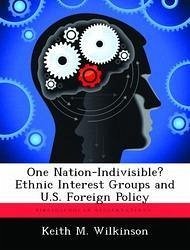Using a review of current print and electronic media, this research paper explores the role of ethnic interest groups in shaping U.S. foreign policy. In particular, the paper looks at the increased political power wielded by America's ethnic population based on both their increasing percentage of the overall population and the growing sophistication of their lobbying efforts. The experiences of Jewish- and Irish-Americans are used as examples of successful group influence. These successes are contrasted against the initial failures of two other groups, Armenian- and Arab-Americans, to influence foreign policy. The discussion continues by examining the learning curves of these latter groups and provides examples of more recent lobbying successes. The paper next discusses the implications for future foreign policy priorities. Of particular significance was the increased diversity of ethnic origin indicated by U.S. census data. In light of the proliferation of ethnic conflicts following the demise of the Soviet Union, there is a correspondingly increased likelihood that among these groups are those with strong ties to an ancestral homeland where movements for self-determination will spark efforts to influence U.S. policy. The research also supported the conclusion that the ultimate purpose of lobbying efforts is to convince the relevant decision-makers and not necessarily to influence overall public opinion. As an increasingly important dynamic in the foreign policy formulation process, an appreciation for the role of ethnic interest group influence is essential to both the diplomatic and military professional.
Hinweis: Dieser Artikel kann nur an eine deutsche Lieferadresse ausgeliefert werden.
Hinweis: Dieser Artikel kann nur an eine deutsche Lieferadresse ausgeliefert werden.








